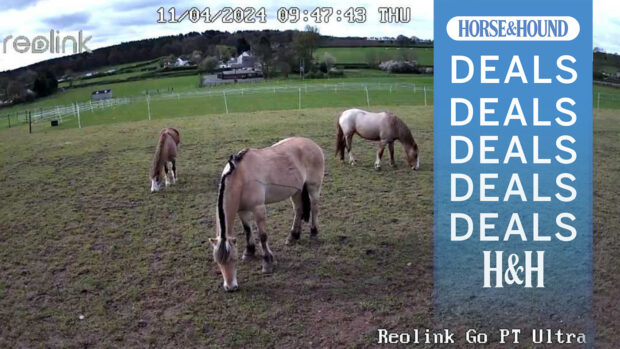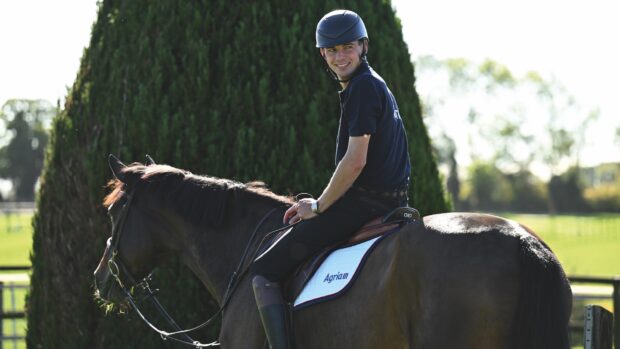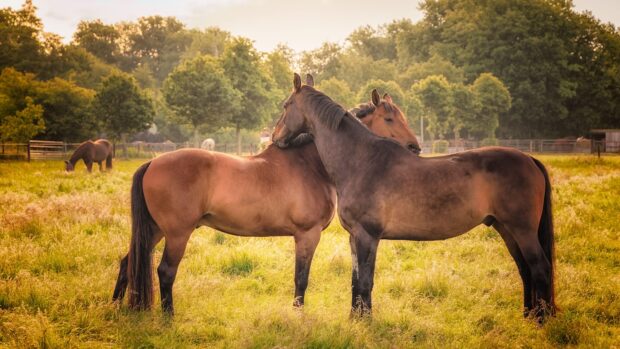With warmer weather finally here, many horse owners will have been debating whether or not to turn out their horses, while some have no choice in the matter.
When winter months approach, the same question is pertinent — should you turn out your horse 24/7 or should they come in? We ask the experts plus get the opinion of H&H readers…
What the vet says on turning horses out…
Karen Coumbe MRCVS says: “Keeping a horse in during the winter has some obvious benefits such as the fact they will be clean and tidy, but more importantly safer as they will not have the chance to suffer from paddock injuries impacted by the lack of grass and slippery mud, pulled shoes, plus less mud fever, rain scald and other skin rashes.
“However, there are drawbacks to this routine too. Horses that are stabled are more prone to coughs and small airway inflammation, especially if the stables are not very well ventilated or the bedding and hay is dusty. At the end of the day, they are confined in a small area, which is both their bedroom and their bathroom. You might also experience an increase in behavioural issues as some horses can get bored when confined to a small stable.
“Colic is more of an issue in stabled horses, particularly impactions, especially if they eat their bedding. Research has shown that large intestinal motility assessed by ultrasound was significantly reduced in stabled horses compared to those at pasture. They are thought to be most at risk if or when there is a sudden change in management, such as being brought in as the weather is bad.
“Regular exercise is vital to help well-being with stabled horses. If they are on high levels of feed and stabled for lengthy periods of time, some horses can also be more susceptible to tying up and muscle disorders. Similarly, horses with ongoing osteoarthritis will stiffen up if confined to their boxes.
“Conversely, horses that are out at pasture are far more likely to injure themselves. This is not just from kicks from field companions or tangles with fencing or gates, but also at this time of year we see a rise in the number of eye injuries in horses that are turned out frequently, or 24/7 as they start looking for food in hedgerows due to a lack of grass in their fields.
“During the warmer months, horses that are turned out can become bothered by flies, with some being sensitive to insect bites and developing problems such as sweet itch. Horses will suffer if they aren’t sprayed with fly repellent and wearing good fly rugs. Horses that are turned out in windier locations away from woods are likely to suffer less as fewer flies are likely to be present to bother them. Conversely the leg mites that particularly plague heavier horses are often worse in a stabled environment.
“Owners also need to be very aware of their horses’ diet with full-time turnout during the spring and summer. Although less grass is not the only factor as general overfeeding and lack of exercise will not help, but ponies in particular when turned out may gain excessive weight and could be prone to laminitis.
“If horses are stabled, their diets are more easily controlled and their general health monitored. It is hard to know what a horse’s food and water intake is when they are turned out all of the time. Parasitic worms are also more prevalent in horses kept at grass, plus there is always the chance of horses suffering from diseases linked to the ingestion of poisonous plants — for example Atypical Myopathy, due to ingestion of sycamore seeds. The other key worry in the spring months has to be grass sickness, which is almost always seen in grazing horses.
“Overall, I would recommend keeping a horse in the most natural way as possible, but you must treat each horse as an individual, catering to its own needs and balancing with its job in life.”
What the British Horse Society says on turning horses out…
A welfare education manager from the British Horse Society says: “Horses are herd animals and therefore prefer to live together in a social group which provides many advantages for them such as company, feeling of protection and mutual grooming.
“For young horses, having companions provides the opportunity for play and learning the etiquette of living in a herd. It is important to remember that horses should be treated as individuals and any signs of bullying, particularly during the winter when additional feed is given, is monitored to ensure it does not have a detrimental effect on the welfare of that horse. Donkeys have a strong need for socialisation and will often create strong bonds with their companions; they can subsequently become ill if separated.
“There are occasions when horses may need to be turned out individually. Horses recovering from an injury or being re-introduced to turnout following a period of box-rest will need a safe area until they have fully recovered. When introducing horses to a new group, it is strongly advised, where possible, to turn out the new arrival in an adjacent paddock for a few days so the horses can safely meet their new herd member.
“Many livery yards provide same-sex turnout such as geldings and mares only. This is often implemented to help prevent any problems when mares come into season. Stallions and older colts will often be kept on individual turnout to help prevent indiscriminate breeding or aggressive behaviour.
“Some yards opt for individual turnout for all horses regardless of their circumstances. It is important to be aware that a principle element of companionship has been removed for these horses and additional care may need to be provided. For example, in the summer months horses naturally work together in their herd groups to keep themselves comfortable by standing head to tail and swishing the flies off each other’s faces. Horses kept on individual turnout will not have the luxury of a field companion to help keep them comfortable and therefore may benefit from a fly mask and rug”.
What the H&H readers say…
Kate Rickards: “I have a small herd of natives who all live out 24/7. We are lucky that we have a seven acre field with plenty of natural shelter.
“I think there are many pros to being turned out 24/7. I feel very strongly about the benefits of being turned out in a herd, where they can act naturally and freely. Surely this has to be the key to a content and happy equine, and closest to their natural environment. As my herd get older too I think it’s good for their joints to be moving around, and helps them maintain a low level of fitness. I don’t feel there are many cons to 24/7 turnout when it comes to pony welfare. I can rug them as required, according to weather conditions if required, and I can put them in a stable in cases of extreme weather or illness.”
Jessica Dunford: “My horses live out on a ‘track system’. I find this gives them all of the room they need to move around and graze, but without access to a huge field of lush grazing.
“The track system encourages them to do more miles per day, meaning they are ‘worked’ all the time and are less of a handful when it comes to being ridden. I specifically place their feed, water, and salt/mineral licks at opposite ends of the field, to encourage them to ‘browse’ more. I worry much less about things such as gastric ulcers, laminitis and arthritis because my horses are able to move and eat naturally. We have nine stables, which are always bedded down, but are only ever used for emergencies and all the horses are very happy with this arrangement.”
Alice Page: “We are lucky enough to have enough grazing to cater for all year round turnout and grazing. We feel that it is beneficial to all our horses of all ages to live out as a herd.
“We have found that it stops stiffness issues in older horses and in horses who have hunted during the day in the winter months. During the winter months we are lucky enough to have their grazing close to the yard, where we have a large barn and lean-to for the horses to shelter should they wish.
“They use it but more often than not, they choose to stay out in the elements — driving cold rain is really the only time that they shelter. In the summer months we have a field shelter available to them in their summer paddocks, which they use to shelter from flies.”
You might also be interested in:
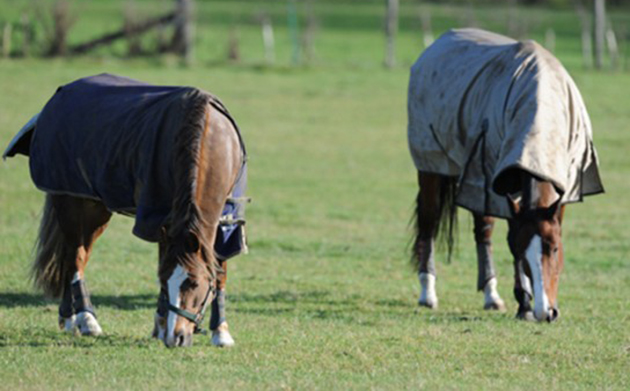
Individual or group turnout for horses: what’s the verdict?
Whatever your preference or circumstances regarding turnout, it is important to look at your horse as an individual and make

Electric fencing for horses – everything you need for a temporary setup or strip-grazing
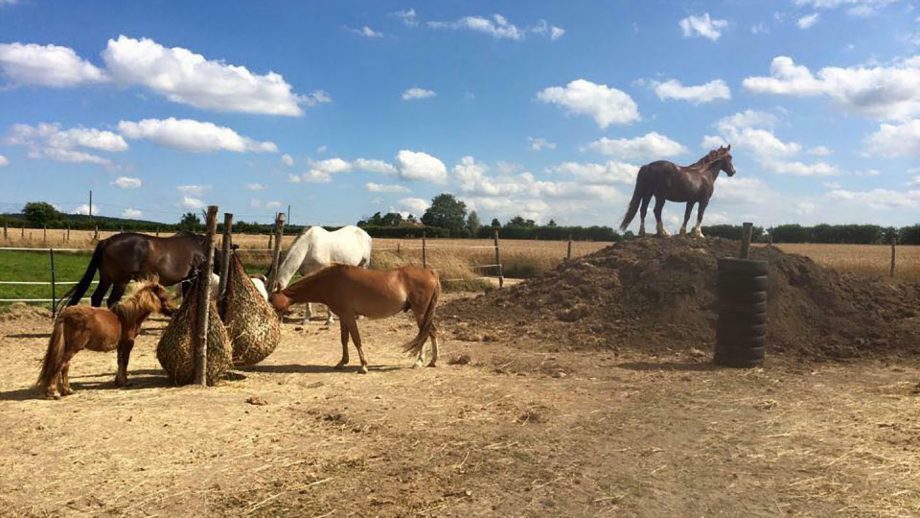
Track living: the alternative horsey set-up

Subscribe to Horse & Hound magazine today – and enjoy unlimited website access all year round
Horse & Hound magazine, out every Thursday, is packed with all the latest news and reports, as well as interviews, specials, nostalgia, vet and training advice. Find how you can enjoy the magazine delivered to your door every week, plus options to upgrade your subscription to access our online service that brings you breaking news and reports as well as other benefits.


